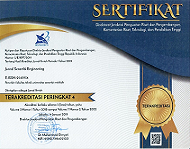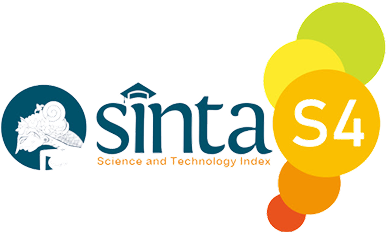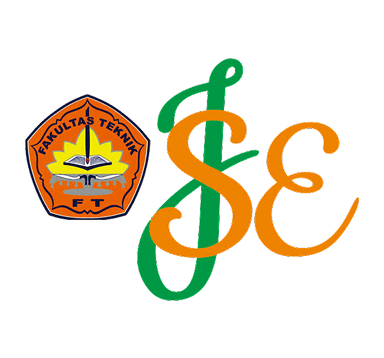Pengaruh Aktivator dan Laju Alir dengan Metode Slow Sand Filter Menggunakan Kombinasi Karbon Aktif Alami untuk Pengolahan Air Telaga
Keywords:
Activator, Activated Carbon, Flow Rate, Slow Sand FilterAbstract
Lake water contaminated with domestic sewage is a serious problem as it can pollute the surrounding environment, as in Telaga Rambit, Gresik. Turbid water quality indicates pollution, so a treatment process is needed before use. This study aims to analyse the effect of activator type and flow rate on the filtration process using the slow sand filter (SSF) method, with a combination of coconut shell charcoal and rice husk charcoal media. The flow rate variations used were 0.1 m³/h and 0.3 m³/h, with hydrochloric acid (HCl) and phosphoric acid (H₃PO₄) activators. The results showed that Reactor B, using H₃PO₄ at a flow rate of 0.1 m³/h, was the most effective variation in reducing pollutant levels, namely BOD by 1.9 mg/l, COD by 6.26 mg/l and TSS by 12 mg/l at the 25th sampling time. The H₃PO₄ activator has been shown to increase the adsorption capacity of activated carbon media, particularly in the capture of suspended solids. The low flow rate also provided better stability during the filtration process, allowing for more effective particle retention. After 25 minutes, the filtration media had not reached saturation point, indicating that filtration could be improved with longer contact times.
References
[1] Amin, M. (2023). Pengaruh Aktivator HCl, H3PO4, NH4Cl Terhadap Kualitas Karbon Aktif Dari Tempurung Kelapa. Majalah Teknik Industri, 31(1), 33-40.
[2] Artiyani, A., dan Firmansyah, N. H. (2016). Kemampuan Filtrasi Upflow Pengolahan Filtrasi Up Flow Dengan Media Pasir Zeolit Dan Arang Aktif Dalam Menurunkan Kadar Fosfat Dan Deterjen Air Limbah Domestik. Industri Inovatif: Jurnal Teknik Industri, 6(1), 8-15.
[3] Bakkara, C. G., dan Purnomo, A. (2022). Kajian Instalasi Pengolahan Air Limbah Domestik Terpusat Di Indonesia. Jurnal Teknik ITS, 11(3), D75-D81.
[4] Bermuli, F. Z., Manganka, I. R., dan Dundu, A. K. (2023). Metode Filtrasi Dengan Media Sekam Padi, Arang, Batu Zeolit Dan Pasir Kuarsa Untuk Menurunkan Kadar BOD, COD Dan TSS Pada Air Limbah Domestik. TEKNO, 21(86), 1867-1873.
[5] Chairunnisa, Z. N., & Fuadi, A. (2023). Efektitivitas Adsorben Karbon Aktif dari Tempurung Kelapa untuk Pengolahan Limbah Cair Pabrik Tahu. Inovasi Teknik Kimia, 8(1), 17–25.
[6] Desiana, N., Ngatijo, N., & Lagowa, M. I. (2022). Pengelolaan Air Limbah Tambang Dengan Metode Bioadsorbsi Menggunakan Karbon Aktif Tempurung Kelapa. Jurnal Teknologi Mineral Dan Batubara, 18(2), 97-103.
[7] Dwityaningsih, R., Rahayu, T. E. P. S., Handayani, M., dan Nurhilal, M. (2023). Pengaruh Variasi Konsentrasi H₃PO₄ Sebagai Zat Aktivator Terhadap Karakteristik Karbon Aktif dari Sekam Padi. Infotekmesin, 14(1), 98-104.
[8] Erawati, E., dan Fernando, A. (2018). Pengaruh jenis aktivator dan ukuran karbon aktif terhadap pembuatan adsorbent dari serbik gergaji kayu sengon (Paraserianthes Falcataria). Jurnal Integrasi Proses, 7(2), 58-66.
[10] Fachria, R., Ramdan, H., & Aryantha, I. N. P. (2019). Efektivitas pengolahan limbah cair industri penyamakan kulit Sukaregang Garut dengan adsorben karbon aktif dan ijuk. Jurnal Pengelolaan Lingkungan Berkelanjutan (Journal of Environmental Sustainability Management), 379-388.
[11] Gudadhe, S. K. (2022). Rice Husk Is Use to Treatment of Gray Water. Int. J. Adv. Res. Biol. Sci, 9(1), 96-99.
[12] Hatina, S., & Komala, R. (2020). Pemanfaatan HCl dan CaCl2 sebagai zat aktivator dalam pengolahan limbah industri tahu. Jurnal Redoks, 5(1), 20-31.
[13] Hasan, R., Tedja, T., Riani, E., & Sugiarti, S. (2016). Pengaruh Aktivasi Fisika dan Kimia Arang Aktif Buah Bintaro Terhadap Daya Serap Logam Berat Krom. Biopropal Industri, 7(1), 35-45.
[14] Huisman, L. dan Wood, W.E. (1974), Slow Sand Filtration Handbook. World Health Organitation, Geneva, Swistzerland.Indonesia: 3981.
[15] Kusniawati, E., Sari, D. K., dan Putri, M. K. (2024). Pemanfaatan Sekam Padi Sebagai Karbon Aktif Untuk Menurunkan Kadar Ph, Turbidity, TSS, dan TDS. Journal Of Innovation Research And Knowledge, 2(10), 4183-4198.
[16] Mulia, M. H. (2022). Pengolahan Air Bersih Dengan Metode Filtrasi Menggunakan Media Pasir Besi (Doctoral dissertation, uin ar-raniry).
[17] Nustini, Y., dan Allwar, A. (2019). Pemanfaatan Limbah Tempurung Kelapa Menjadi Arang Tempurung Kelapa Dan Granular Karbon Aktif Guna Meningkatkan Kesejahteraan Desa Watuduwur, Bruno, Kabupaten Purworejo.
[18] Rahayu, A., Maryudi, M., Nuraini, N., Amrillah, N. A. Z., Mulyadi, I., & Hanum, F. F. (2023). Reduction of COD, pH and Phosphate Levels in Laundry Wastewater Using Multi Soil Layering (MSL) Method. Jurnal Sains Natural, 13(1), 31-38.
[19] Riandi, I., Slamet, S., dan Hidayah, N. (2021). Perbedaan Ketebalan Media Filtrasi Arang Sekam Padi Terhadap Penurunan Kekeruhan Pada Air Bersih di PT. X. Jurnal Kesehatan Siliwangi, 2(2), 567-575.
[20] Verayana, M. P., & Iyabu, H. (2019). Pengaruh aktivator HCl dan H3PO4 terhadap karakteristik (morfologi pori) arang aktif tempurung kelapa serta uji adsorpsi pada logam timbal (Pb). Jurnal Entropi, 13(1), 67-75.
[21] Wulandari, F., Erlina, E., Bintoro, R. A., Budi, E., Umiatin, U., dan Nasbey, H. (2014, October). Pengaruh Temperatur Pengeringan Pada Aktivasi Arang Tempurung Kelapa Dengan Asam Klorida dan Asam Fosfat Untuk Penyaringan Air Keruh. In Prosiding Seminar Nasional Fisika (E-Journal) (Vol. 3, pp. 289-293).
Downloads
Published
Issue
Section
License
Copyright (c) 2024 Safitri Wahyu Pratiwi, Aussie Amalia (Author)

This work is licensed under a Creative Commons Attribution 4.0 International License.












